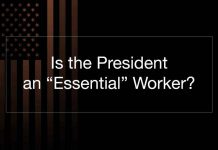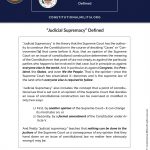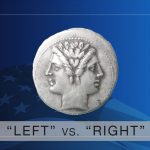Last Updated on October 3, 2021 by Constitutional Militia
It is said that “no man is taken for a prophet in his own country”. Yet sometimes evidence overcomes this negative presumption. In my recent NewsWithViews commentary entitled “The Irrelevant Second Amendment”, I predicted that the decision in Kolbe v. Hogan—that so-called “assault firearms” such as the AR-15 are not protected by the Second Amendment in any way, shape, or form—would become “gun-control” fanatics’ legalistic weapon of choice for banning possession of those firearms, and much more besides, by average Americans. So was it written; and so has it come to pass.
On 5 April 2018, William G. Young, a United States District Judge in Massachusetts, upheld that State’s “assault-firearms” statute on precisely that ground. Worman v. Healey, Civil Action No. 1:17-10107-WGY, opinion reproduced, particularly at pages 26-34 and 46-47.
No doubt this decision will be appealed. But I anticipate that any appeal will be unsuccessful, just as was the ultimate appeal in Kolbe, and for the selfsame reason. One cannot hope to win a Second Amendment case against Kolbe’s and Worman’s “weapons-of-war” theory without relying on: (i) the whole Second Amendment (not just its last fourteen words), (ii) the Militia Clauses of the original Constitution (and the Fifth Amendment, too), (iii) Militia statutes of the General Government such as 10 U.S.C. §§ 252 and 253, (iv) the Militia clauses of the constitution and statutes of the particular State involved in the controversy (in Kolbe, Maryland; in Worman, Massachusetts), and (v) the Supreme Court’s oft-neglected but nonetheless controlling decision in United States v. Miller, 307 U.S. 174 (1939). Judge Young’s opinion in Worman deals with none of these matters, which evidences that the plaintiffs did not raise them. And if they were not raised in the District Court, it will be devilishly difficult for the plaintiffs-appellants to assert them for the first time on appeal. Of course, being inured to taking up what seem to be lost causes, I might not be averse to being asked to provide whatever assistance I could offer in prosecuting an appeal, just as I did on my own initiative in a brief amici curiae when the litigants in Kolbe unsuccessfully petitioned the Supreme Court for a writ of certiorari in their case. But I should hardly anticipate being requested to consult on the future course of litigation in Worman, any more than the Prophets in the Old Testament were heeded with respect to the even-more-weighty subjects on which they discoursed.
This, however, does not dissuade me from prophesying once more. Ever since former Justice of the Supreme Court John Paul Stevens dipped his oar into the murky waters of contemporary Second-Amendment jurisprudence, plumping for repeal of the Amendment, a veritable cottage industry on that score has emerged among “gun-control” fanatics.
Having successfully litigated in the Supreme Court a seminal constitutional case in which Justice Stevens himself wrote the majority opinion—Chicago Teachers Union v. Hudson, 475 U.S. 292 (1986)—and having some little self-taught expertise with respect to “the right of the people to keep and bear Arms”, I am probably more qualified than most other NewsWithViews commentators to opine that Justice Stevens’ understanding of the Constitution in general and the Second Amendment in particular leaves a great deal to be desired. For example, as I pointed out in “The Irrelevant Second Amendment”, that Amendment is intimately related to the Militia Clauses of the original Constitution. So, if the Second Amendment were to be repealed with the effect which Justice Stevens apparently envisions—such that average Americans would be dispossessed of “assault firearms”, or perhaps of most or even all firearms, whether at one fell swoop or by “the death of a thousand cuts” through a parade of ever-more-onerous statutory “regulations”—the Militia Clauses would have to be repealed or significantly amended, too (along with the reference to the Militia in the Fifth Amendment). As of now, proponents of repeal of the Second Amendment have not thought this complexity through (or, from what I have read in their rants, even considered it). So I suspect (perhaps “hope” is the more accurate verb) that the propaganda and agitation for the Amendment’s repeal will ultimately fizzle out as a result of their own incoherence. While this controversy continues to sizzle in its own hot grease like an overdone sausage cooking in the mass media’s frying pan, though, self-styled champions of “the right of the people to keep and bear Arms” will find themselves constantly on the strategic defensive—a disadvantageous position which will compel them to make one self-defeating compromise after another with “gun-control” fanatics over “common-sense regulations” (that is, actual “infringe[ments]”) of that “right”.
A particularly ominous straw in the wind is that some defenders of “the right of the people to keep and bear Arms” are already conceding defeat as to the Second Amendment by arguing that, as a “natural right”, “the right of the people to keep and bear Arms” can be secured under the aegis of the Ninth Amendment, even were the Second Amendment repealed. This makes little sense, both as a matter of constitutional law and as a matter of political realism.
First, the Ninth Amendment provides that “[t]he enumeration in the Constitution, of certain rights, shall not be construed to deny or disparage others retained by the people”. Now, “the right of the people to keep and bear Arms” is one of the “certain rights” explicitly “enumerat[ed] in the Constitution”—in the Second Amendment. So, by the very terms of the Ninth Amendment, that “right” is not now one of the “other[ rights] retained by the people” perforce of the latter Amendment. Therefore, if the Second Amendment were repealed, “the right of the people to keep and bear Arms” could not be shoe-horned into the Ninth Amendment in keeping with the original understanding of that Amendment. Perhaps invocation of “the living Constitution” could suffice to square this circle—which I doubt, inasmuch as “the living Constitution” has always been “gun-control” fanatics’ primary device for circumventing and undermining the Second Amendment. Certainly no judge antagonistic to “the right of the people to keep and bear Arms” will ever employ “the living Constitution” to breathe new life through the Ninth Amendment into the principles of the Second Amendment after that Amendment’s demise by way of repeal.
Second, the obvious political conclusion to which every half-educated American would come were the Second Amendment repealed would be that “the right of the people to keep and bear Arms” had thus been entirely excised from the Constitution. For if, as most self-deluded champions of the Second Amendment contend, the Amendment’s last fourteen words by themselves alone guarantee that “right”, then the Amendment’s repeal would be fatal for whatever “right” those words might be taken to cover. After all, for such as Justice Stevens, that would be the point of repealing the Second Amendment—which, I am confident, judges such as those who decided Kolbe and Worman would be quick to hold.
By now, I am sick unto death of reminding readers of my NewsWithViews commentaries and various books (and, I fear, my readers may be becoming tired of being reminded) that “the right of the people to keep and bear Arms” cannot be properly construed outside of the total constitutional context in which it resides. That context emphasizes the inextricable connection of that “right” with the Militia, not with some largely imaginary anarchic “individual right” located in the last fourteen words of the Second Amendment, let alone in so-called “penumbras and emanations” of the Constitution wholly unrelated to the Militia. Had that not always been apparent, at this juncture it surely has been made crystal clear by Kolbe and Worman.
If this lesson is not heeded, and soon, one will not need the special benefit of the gift of prophecy to foresee to what disastrous climax these developments will inexorably lead.
©2018 Edwin Vieira, Jr. – All Rights Reserved.




































